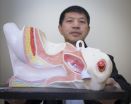New research: Coffee not associated with lifestyle diseases
2015-07-09
(Press-News.org) Danish researchers are the first in the world to have used our genes to investigate the impact of coffee on the body. The new study shows that coffee neither increases nor decreases the risk of lifestyle diseases.
We love coffee - and we drink a lot of it. New research from the University of Copenhagen and Herlev and Gentofte Hospital shows that coffee neither increases nor decreases the risk of developing lifestyle diseases such as obesity and diabetes. The researchers have based their study on genes, as our genes play a role in how much coffee we drink in the course of a day. The study has just been published in the well-reputed International Journal of Epidemiology and is based on DNA and information about coffee drinking and lifestyle diseases from 93,000 Danes from the Copenhagen General Population Study.
"We are the first in the world to have investigated the relationship with genes associated with a lifelong high consumption of coffee. These genes are completely independent of other lifestyle factors, and we can therefore conclude that drinking coffee in itself is not associated with lifestyle diseases," says medical student Ask Tybjaeg Nordestgaard from the Department of Clinical Biochemistry at Herlev and Gentofte Hospital.
Genes determine our thirst for coffee
The researchers have designed a unique study, where they have looked into a number of genes that affect our desire for coffee. If you have the special coffee genes, you may be drinking more coffee than those not having the genes. This allows the researchers to see whether a higher coffee consumption increases or decreases the risk of developing lifestyle diseases.
"We can now see that the coffee genes are surprisingly not associated with a risk of developing type 2 diabetes or obesity. This suggests that drinking coffee neither causes nor protects against these lifestyle diseases," says Boerge Nordestgaard, clinical professor at the Faculty of Health and Medical Sciences, University of Copenhagen, and senior physician at the Department of Clinical Biochemistry at Herlev and Gentofte Hospital.
INFORMATION:
ELSE PRESS RELEASES FROM THIS DATE:
2015-07-09
DENVER (July 9, 2015) - A new study from the University of Colorado Denver finds that male exotic dancers, or strippers, remain committed to stripping because it enhances their self-concept.
The study by Maren Scull, an instructor of Sociology in the CU Denver College of Liberal Arts and Sciences, was published online this month in Deviant Behavior, the only scientific journal that specifically addresses behaviors that violate social norms. Scull's research focuses on how exotic dancing influences the way male strippers view themselves.
"Because stripping is a stigmatizing ...
2015-07-09
This news release is available in French.
Since the treatment has become available, HIV is often described as "undetectable" and the risk of transmission has been drastically reduced. However, the epidemic is still quite present in the lives of many gay and bisexual men... and in public spaces. This often overlooked dimension of the disease has been brought to light by Gabriel Girard of the University of Montreal's Public Health Research Institute (IRSPUM) - HIV is still alive in the city, especially in the Village, Montreal's gay district. "Urban traces are significant ...
2015-07-09
WEST LAFAYETTE, Ind. -- A key set of immune cells that protect the body from infection would be lost without directions provided by vitamin A, according to a recent study.
A team of researchers from Purdue University found retinoic acid, a metabolite that comes from digested vitamin A, is necessary for two of the three types of innate immune cells that reside in the intestine to find their proper place.
"It is known that vitamin A deficiencies lead to increased susceptibility to disease and low concentrations of immune cells in the mucosal barrier that lines the intestines," ...
2015-07-09
MADISON, Wis. -- A study authored by two University of Wisconsin-Madison graduate students indicates that while playing video games can improve mood, violent games may increase aggressive outcomes.
The study, authored by James Alex Bonus and Alanna Peebles, graduate students in Communication Arts, and Karyn Riddle, assistant professor in the School of Journalism and Mass Communication, was published in June in the journal Computers in Human Behavior. The researchers looked at how video games may be used to manage emotions -- specifically, whether playing the games can ...
2015-07-09
(Edmonton) Screening newborn babies who are in the neonatal intensive care unit (NICU) using a testing process called high-frequency tympanometry can help identify middle-ear problems earlier, according to newly published research from a local team of researchers.
"If people cannot hear, we need to know if the problem is with the middle ear, inner ear or hearing nerve. Obviously, a baby cannot tell you, so in the clinic it's hard to know when they have hearing loss," explained Ming Zhang, an associate professor at the U of A's Department of Communication Sciences and ...
2015-07-09
The relationship between mental and physical health is well established. But when mental and physical illnesses co-occur, patients' accounts of physical illness are sometimes arbitrarily discredited or dismissed by physicians.
Research by Jeremy D. Coplan, MD, professor of psychiatry at SUNY Downstate Medical Center, and colleagues has documented a high rate of association between panic disorder and four domains of physical illness. The research could alter how physicians and psychiatrists view the boundaries within and between psychiatric and medical disorders.
"Patients ...
2015-07-09
Green buildings are indeed healthy buildings. So says Dr. Joseph Allen and fellow researchers of the Harvard T.H. Chan School of Public Health in the US. They conducted the first comprehensive review of studies that focused on green buildings and summarized the health benefits for the people who work and live in them. The review is published in Springer's journal Current Environmental Health Reports.
The green building movement has taken off in the past 10 years. According to Leadership in Energy and Environmental Design (LEED®), which certifies green building standards, ...
2015-07-09
In about one-sixth of the cases of male infertility, men do not make any measurable levels of sperm, a condition called azoospermia. New research led by University of Pennsylvania scientists suggests that mutations in an X chromosome gene called TEX11 are responsible for about 1 percent of azoospermia cases.
The investigators also found that in mice bred to lack the gene, reintroducing the gene restores their fertility. Additional studies in mice revealed that a certain amount of the TEX11 protein expressed from the gene is needed for sperm to form. The protein plays ...
2015-07-09
An expert panel convened by the International Society for Sexual Medicine has developed a detailed "Process of Care" for the diagnosis and management of testosterone deficiency in men.
After an extensive literature review and in-depth consultations, the panel of 18 experts from a wide range of medical disciplines recommended that testosterone deficiency be defined as a clinical and biochemical syndrome characterized by both a deficiency of testosterone or testosterone action, and relevant symptoms. The panel stressed that the condition may affect multiple organ systems ...
2015-07-09
For the first time, a new analysis shows an impact of climate change on human society long before we knew the climate was actually changing.
Exploring Google's scanned book collection, the analysis finds that society in general increasingly discussed some of the predicted effects of climate change--such as heat waves, drought, and flooding--long before current global weather alterations were widely known about.
The authors note that while the science of climate change and climate action has come under sustained political attack, buttressing the physical record with ...
LAST 30 PRESS RELEASES:
[Press-News.org] New research: Coffee not associated with lifestyle diseases


